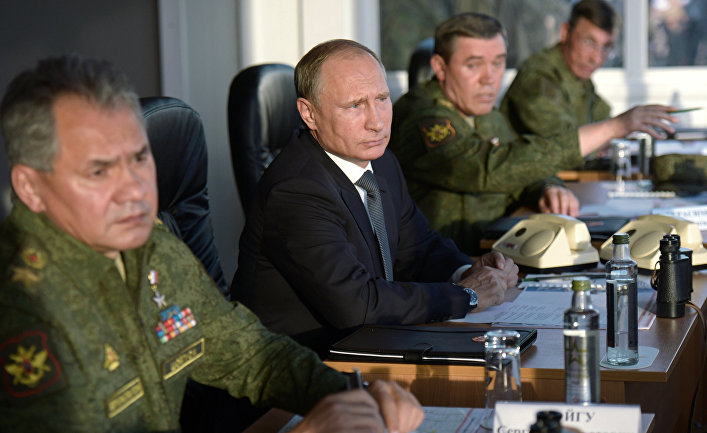Washington is bracing for negotiations aimed at a political resolution of the Syrian conflict — calling on Russia and Iran as mediators in the dialogue with Syrian President Bashar al-Assad. Meanwhile the USA is making no official demands for the Syrian leader to step down — judging from statements of State Department Secretary John Kerry. Although Russian and American positions on Syria are converging, the notion of cooperation with Russia doesn't sit well with all members of America's political elite.
On Saturday the Head of the US State Department, John Kerry, approached Russia with the idea of using their influence with Syrian President Assad — to force him to the negotiating table and resolve the Syrian conflict. “We must begin talks. That's what we're waiting for – so we hope Russia, Iran, and other countries with influence (on Assad – Editors) can help us”, Mr Kerry said, in a meeting with British Foreign Secretary Philip Hammond.
The idea that Russia and Iran – Damascus's main allies in the region – could persuade Assad to begin talks is the first suggestion of its kind to be made public by the USA.
Kerry made his announcement the day after a phone conversation between US Defense Secretary Ashton Carter and his Russian counterpart Sergey Shoigu — during which both sides discussed the Syrian situation.
Pentagon sources confirmed that the American defense chief used the call to highlight “the necessity and importance of such consultation, alongside the diplomatic negotiations that will herald primary political transition in Syria.”
The German weekly Bild am Sonntag reported on Sunday — citing internet sources — that US and Russian intelligence staffers had met in Moscow to exchange information on the Syrian situation. Bild claims the USA is ready to share its intelligence findings about ISIL with Moscow.
The Russian-American talks on Syria could continue at Vladimir Putin's planned meeting with Barack Obama, on the sidelines of the UN General Assembly Congress in New York in late September. However, there is still no confirmation of this meeting — as President Putin's Foreign Policy Advisor Yuri Ushakov said on Saturday. Despite this, insiders believe such a brief meeting “cannot be ruled out”.
Attempts to secure a political resolution to the Syrian conflict continue against the background of increasing deliveries of Russian military hardware to Syria. The Kremlin asserts that the Russian military staff who are working in Syria are providing only technical support to the Syrian army.
The White House, as The New York Times noted on Friday, acknowledges the Kremlin's ability to effect changes in Syrian policy that couldn't be altered in the near future – despite America's strong ambitions.
“The decision to prompt talks similarly proffers the hope that Russia could play a more constructive role in resolving the four-year civil conflict in Syria”, the NYT continued.
Middle-East analyst Theodore Karasik commented that the USA decided to come to the negotiating table after Russia began bolstering its military presence in Syria.
Experts have noted that the Obama administration's need to take this step has prompted Kerry – but that “he is encountering fierce resistance among not only the movers and shakers on Capitol Hill, but also within his own State Department”.
Russia's Council Head for Foreign Policy, Fyodor Lukyanov, commented on Washington's mixed messages with regard to Moscow's actions in Syria. The leaders of one faction are vehemently opposed to Moscow doing the slightest thing in Syria — while leaders of the opposing Washington faction are warming towards collaboration with Moscow. “That's how their split on negotiations looks”, Mr Lukyanov commented.
Kerry's announcement seems to mark a softening of American policy on Syria. While the USA still connives at Assad's ouster, the urgency of this demand has quietened. Lukyanov concludes from this idea has filtered down from the top, while cautioning that American officials have long muttered that Assad's removal isn't essential. “Now they're openly saying it's not a prerequisite. Their position is shifting.” says Lukyanov.
Opinion in Russian political circles suggests it is not the Syrian president who is being protected, but the country's legal government. With this in mind, Moscow is similarly cooperating with Assad's opponents among the flagging opposition – Russian FM Sergey Lavrov has held discussions with them.
Lukyanov believes it is not President Assad's future which is the main concern — but instead who might lead Syria when Assad goes? And what kind of Syria would it be? Experts fear that a nation whose official government controls only 20% of the country cannot hold together.
In a recent article in Gazeta.ru, Mr Lukyanov wrote: “Seeing that Syria can't be saved as a united country, Moscow's interests lie in saving the part of the country inhabited by the Alawites – the ethnic minority to which Assad himself belongs. These are also the areas where Syria's Christian minority live. These minorities could be annihilated if the armed forces of ISIL — a banned organisation in Russia — reach those areas.”
However, if Russia – despite the chilly political atmosphere – could reach consensus with the USA on Syria, it would make it harder to bring Iran into the dialogue too.
Despite the success of the USA's nuclear talks with Iran, Iran's political leader Ayatollah Hameini has declared that Iran refuses to attend any talks whatsoever with the USA on other issues.
Alexander Braterskiy






